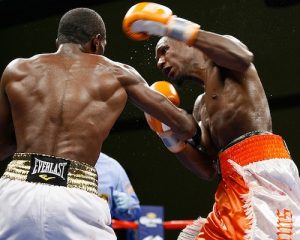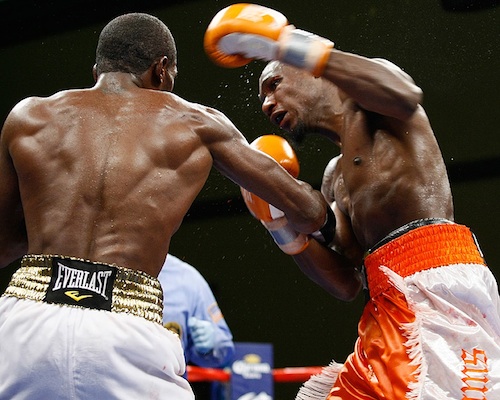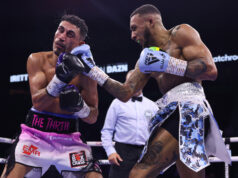It’s imperative for a sport to produce results that accurately reflects the action we see in the field of play. The accuracy of other sporting events is certainly tied to the ability of quality officials, but not to the extent of boxing. Imagine a baseball or football game where no score is kept, but a group of referees simply cast a verdict at the end of the game. Well, more often than not, that happens in boxing.
Boxing judges are actually the most powerful sporting officials in the world of athletics—with an almost godlike ability to alter a man’s fate. Countless careers have been either enhanced or destroyed by the opinions of these men and women. Therefore, the need exists to not only guarantee the competence of these judges, but to make sure the system under which they operate is adequate in rendering life-changing decisions.

Lately, we have seen awful judging that has robbed men of their deserving glory. Something needs to be done expeditiously. Bad judging and decisions that seem to bear no reflection of what the fans are watching alienates fans and possible future participants of the sport. Boxers and everyone involved in the sport have a right to a scoring system that consistently awards victories to the winning fighter, rather than the current system where one is conditioned to begin bristling before the decision is even read.
Here are some things that can perhaps improve our current system:
Scoring More Even Rounds
Ever hear that a round was “too close to call?” Then why call it? There is a pervasive notion in the business that scoring even rounds is a copout. It’s a practice that is generally frowned upon. The common belief is that a judge should not score more than one round even in any given fight. Why? Is being decisive more important than being accurate?
Anybody who scores fights from home has surely come across rounds where an argument can be made for both fighters. Then there are of course rounds where there is no dispute. Under the current system, a fighter can utterly dominate his opponent and have that be usurped by his opponent edging one of these “coulda gone either way” rounds. We’ve all seen fights where the big-money fighter is dominated clearly in 6 rounds, while merely holding his own in the other 6 rounds. In that case, bet your bottom dollar that the marquee fighter will receive at least a draw. How is that even remotely reflective of reality?
A fighter should not be given credit for winning a round if he was unable to establish any discernible foothold or edge over his opponent. We all know that judges give rounds to fighters out of some obligation to just give the round to somebody. If you have to think too hard after a round about who won it—score it even.
This will allow the key rounds to stand out as they should. Take the recent Paul Williams-Erislandy Lara fight, for example. Lara won at least 6 rounds as clear as day, as he rocked the head of Williams back and forth in graphic fashion. One could say Williams was not dominated in the other 6 rounds, but he failed to win any one of them as clearly as Lara had in all of the 6 rounds that he dominated.
After the fight, some made the case that Williams had been competitive in enough rounds to justify him receiving the scores the judges gave him. But the feeling was widespread that Lara had been robbed—to the extent where all 3 judges were indefinitely suspended. This fight is a microcosm for why more rounds should be scored evenly. Giving fighters credit for nip n’ tuck rounds should not carry the exact same amount of weight as a fighter dominating a round.
It would be like if in baseball, the games were judged by which team won more innings instead of the final score. If a team outscores their opponent 1-0 in five innings but loses the other four innings by scores of 4-0, they would lose that game 16-5. In boxing, the team with 5 runs would win. It’s time to stop judging a bout as 12 individual mini-fights that exist in a vacuum. The only way to do that is to encourage judges to score more even rounds in stanzas where a clear winner cannot be determined.
Panels
This would be far more difficult to institute, especially without a singular boxing commission. But in each fight, 20 people would be selected to score the fight unofficially. These people can be writers, ex-boxers, trainers, or anyone who is respected in the sport and has shown a history of credibly scoring fights. The idea here is to catch bad scores that are unanimously contradicted by the panel. If the 20-man panel is unanimous in their opinion, but the judges vote for the other boxer, then you can be fairly sure there is something wrong.
There could be the occasional aberration, but there would be no logical explanation how judges can claim they rendered a righteous decision if zero out of 20 panelists agreed with their verdict. This will allow commissions to see if their judges are in-line with what everyone else in seeing.
It provides some form of hard data to substantiate a faulty score. It’s not enough to merely say a decision is bad or to quote an informal poll of ringside media. Imagine if Erislandy Lara were able to claim that zero out of 20 panelists thought Williams won. It would give the victims of these decisions something tangible to point to in their defense.
Along those same lines, there are often times where fighters in a bout are obviously the bigger meal ticket than their opponents. The commission should, when it’s obvious, take note of who the bigger-time fighter is—the fighter whose success directly helps the powers-that-be in the sport. If a pattern is detected where a judge exclusively gives the win to the marquee guy fighter in every close fight, it should raise red flags. If the panel is split on who won those fights, while a certain judge always picks the bigger-name fighter, it would tend to suggest some undue influence. And keeping track of it all would help weed out judges who are either incompetent or corrupt.
Professional boxing isn’t alone in bad judging problems. Check out this guide on the problems with Olympic boxing judging & scoring
Blacklists for Judges
Hats off to the New Jersey commission for suspending the 3 judges in the Williams-Lara fight. It’s a start. But a comprehensive lists of poor judges should be compiled in an effort to clean house. Even today, you can sometimes hear Eugenia Williams announced as a judge and you wonder if you’re hearing the ring announcer right. After she scored the first Lewis-Holyfield fight an egregious 115-113 for Holyfield, her right to judge should have been irrevocably stripped.
At the very least, there should be a “three-strikes” policy. Anyone can have an off-night. But if you manage to wrongfully deny 3 men of their glory, it might be time to find something else to do. It would require some solid bookkeeping to keep track of all this. But something needs to be done so the judges who scored Williams-Martinez I 119-110 for Williams, Chris Martin-Chris Avalos 98-94 for Avalos, and Juan Diaz-Paul Malignaggi I 118-110 for Diaz have an eye kept on them.
This list can help rank judges and create a case for removing bad ones. Arbiters who either always vote for the big-ticket guy or score fights well out of range of the norm will be placed on this list. If enough negative data is compiled on one judge, a hearing can take place to determine that judge’s competence and objectivity. And when really big fights take place, judges can be chosen who are not on this list.
Separating Judges From Promoters and Managers
Is there any reason for judges to be mingling with the power brokers in the sport? Judges are merely operatives of the state athletic commission and it is of great importance that their objectivity never be compromised. The relationship between judges and the big-wigs in the sport should be viewed with same contempt that the NCAA uses when dealing with improper relationships between agents and amateur athletes.
It’s not easy. Judges and the power people in boxing often mix in the same circles. They see each other a lot. But their right to be chummy does not supercede the need to keep the sport free of corruption or the perception of it. These guys should not be talking to each other, visiting each other’s homes, or socializing on any level. Heck, I don’t even want to see them being Facebook friends.
Any judge should not be allowed to have anything but passing contact with a promoter, manager or anyone with a vested interest in the fighter. Anyone caught violating this order will be banned if proven guilty.
Conclusion
Boxing isn’t exactly “happening” right now. At the very least, it’s in a down-cycle. If the sport begins to develop a farcical air to it, that could be the final nail in the coffin. For a resurgence in the sport to take place, it will need to start edging away from these awful decisions.
Some of these ideas are admittedly half-baked, but extreme measures will need to be taken if this continues. It really isn’t too much to ask that boxing produce results that are in keeping with what everyone sees. Sure, it’s not baseball where a score is visible for all to see. A subjective decision-making process will always be fraught with problems, but it just seems like a system can be created to ensure that bad decisions are exceptions, instead of the norm.











